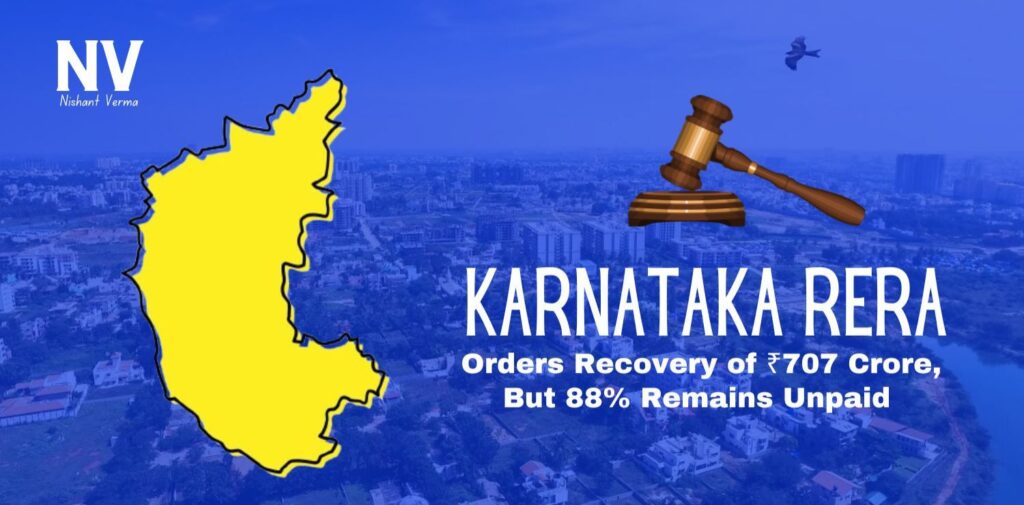The Karnataka Real Estate Regulatory Authority (RERA) has issued recovery orders amounting to over ₹707 crore against real estate developers who failed to deliver on their promises. This move is aimed at protecting homebuyers and ensuring that developers adhere to the commitments made under the RERA Act. However, despite these efforts, 88% of the total amount remains unpaid, leaving homebuyers in distress and questioning the efficacy of the recovery mechanism.
Background of RERA
The Real Estate (Regulation and Development) Act, 2016 (RERA) was introduced by the Government of India to regulate the real estate sector, protect homebuyers, and ensure timely project completion. Karnataka RERA, like other state-level regulatory authorities, is responsible for overseeing the real estate projects in the state and resolving disputes between buyers and developers.

One of the primary functions of RERA is to issue recovery orders when developers fail to meet their obligations, such as delivering projects on time or providing compensation to aggrieved buyers. These orders are legally binding and are expected to expedite the process of justice for homebuyers.
Details of the Recovery Orders
As per the latest update, Karnataka RERA has issued recovery orders worth ₹707 crore. These orders cover a wide range of issues, including:
- Delayed Possession: Developers not handing over possession of properties within the promised timeline.
- Refunds for Canceled Projects: Developers failing to refund amounts for projects that were either canceled or where buyers chose to withdraw.
- Compensation for Defects: Developers being liable to pay for structural or other defects in the properties delivered.
However, despite these recovery orders, only a fraction of the total amount has been recovered. The actual amount collected so far remains minimal, indicating a huge gap between the orders issued and their enforcement.
Why is 88% Still Pending?
Several factors contribute to the pending recovery amounts:
Lack of Compliance by Developers: Many developers continue to delay payments, citing financial constraints or disputing the RERA orders. This non-compliance has led to a backlog of recovery cases.
Inefficiency in Enforcement: The enforcement of recovery orders requires coordination with local revenue authorities. In many cases, this process has been slow, leading to delayed execution of orders.
Legal Challenges: Some developers have moved to higher courts to challenge RERA orders. This has further delayed the recovery process, making it difficult for RERA to ensure timely compliance.
Financial Instability of Builders: With the slowdown in the real estate sector, many builders are struggling with liquidity issues. This has hampered their ability to clear dues and meet the financial obligations imposed by RERA.

Impact on Homebuyers
The non-enforcement of recovery orders has left many homebuyers in a lurch. They are unable to get possession of their dream homes or recover the invested amount. For many, this has led to financial distress, as they continue to pay EMIs on loans taken for properties that have not been delivered.
Buyers who hoped that RERA would be a robust mechanism for resolving their grievances are now disillusioned. The slow recovery rate has undermined confidence in the regulatory authority and its ability to protect their interests.
Steps Taken by Karnataka RERA
In response to the pending dues, Karnataka RERA has been taking several measures:
Regular Follow-ups: The authority is actively following up with developers to ensure that they comply with the recovery orders.

Involving Revenue Authorities: RERA is coordinating with district revenue authorities to expedite the recovery process. Revenue officials have the power to attach properties and bank accounts of developers to recover dues.
Issuing Show-cause Notices: Developers who have failed to comply with the recovery orders are being served with show-cause notices, warning them of further action if they do not settle the dues.
Public Disclosure: In some cases, RERA has resorted to publicly naming and shaming developers who have not complied with orders, in an attempt to pressure them into making payments.
What More Needs to Be Done?
While Karnataka RERA’s efforts are commendable, more needs to be done to ensure better compliance. Some suggestions include:
Stricter Penalties: Introducing stricter penalties for non-compliance, including imprisonment or higher fines, could deter developers from ignoring RERA orders.
Expedited Legal Processes: Setting up fast-track courts for resolving real estate disputes could help reduce the burden on the regular judicial system and speed up the enforcement of recovery orders.
Enhanced Coordination: Improved coordination between RERA, revenue authorities, and financial institutions can ensure that recovery orders are executed more effectively.
Creation of a Recovery Fund: Establishing a fund, similar to an insurance scheme, where developers contribute a certain amount for each project, could help ensure that buyers are compensated even if the developer fails to pay.
Conclusion
The situation with Karnataka RERA’s recovery orders highlights a critical gap in the enforcement of real estate regulations. While the authority has been proactive in issuing recovery orders to safeguard homebuyers’ interests, the lack of compliance from developers poses a significant challenge. It is crucial for RERA and other stakeholders to work together to find more effective solutions for enforcing recovery orders, restoring faith in the regulatory framework, and ensuring that homebuyers are not left helpless.
With the real estate sector being a vital component of the economy, addressing these issues will not only benefit individual buyers but also contribute to a more stable and transparent market in the long run.




